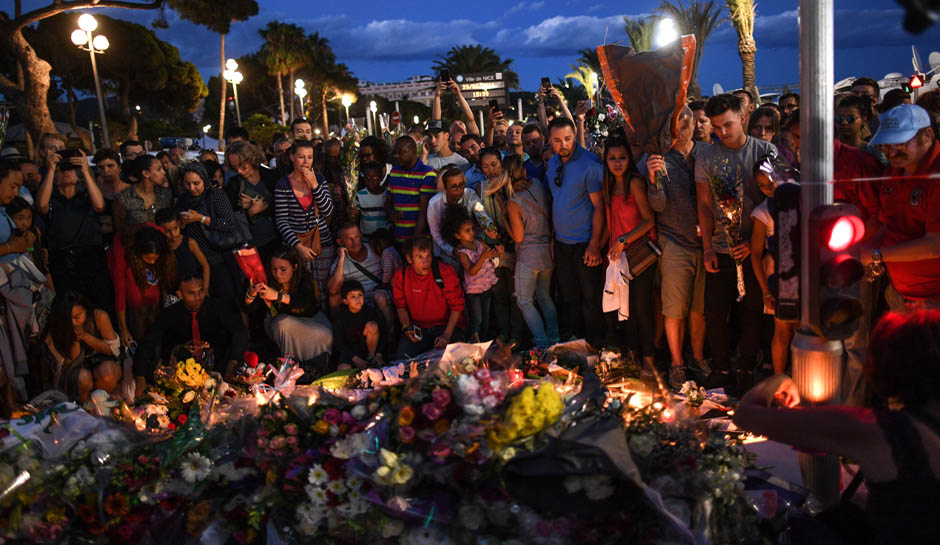
NICE, FRANCE – JULY 15: People visit the scene and lay tributes to the victims of a terror attack on the Promenade des Anglais on July 15, 2016 in Nice, France. (Photo by David Ramos/Getty Images)
by Deeyah Khan
‘It looked like the apocalypse,’ said one observer.
The massacre in Nice began shortly before 11pm on Thursday 14 July, as a 19-tonne white Renault lorry sped down the promenade and began mowing down men, women and children who were celebrating Bastille Day – an event symbolic of France’s most sacred values, commemorating the first act of the revolutionaries that created the Republic. Among all the broken lives – the details almost too heartbreaking to bear: a girl’s body, besides a treasured doll; a boy unvisited in hospital, his parents feared dead – one figure moves into focus: Mohamed Lahouaiej-Bouhlel, the man behind the wheel.
Boulhel, a 31-year-old French-Tunisian delivery driver, was a divorced father of three who had become depressed following the breakdown of his marriage two years earlier, which is likely to have ended through his tendency to violence. He had made his wife’s life a misery, said a neighbour, and was also violent to his children.
Boulhel has been described by those who knew him as a loner, an aggressive man, with no particular interest in religion prior to this event, with a history of petty and violent crime. He had a record for armed assault, domestic violence, threats and robbery, although had never served any time in prison. Boulhel’s lifestyle was far from Islamic, as many observers commented: besides his criminal background, he never attended any mosque, being more interested in women, drugs and mixed martial arts than his faith.
The Islamic State have claimed responsibility for Boulhel’s attack, adding yet more deaths to their bloody tally. Whether or not this massacre was planned with IS before the event it seems likely that it was inspired by its propaganda: chillingly, Isis leaders have previously encouraged supporters to ‘run over’ the ‘filthy French’. In Nice, as in Boulhel’s native Sousse (site of the massacre of 38 tourists by a gunman linked to IS), the ideologies behind jihadism have a powerful attraction to disaffected and violent young men. At the start of this year, 55 young men had left the Alpes-Maritimes department (which includes the city of Nice) to kill and die with IS in Syria and Iraq.
Boulhel’s profile presents a conundrum for our existing understandings of terrorists, where we imagine them as either inspired by a particular understanding of religion, or ‘blowback’ for Western interventions overseas. While interviewing former extremists for Jihad, the documentary I made after conducting two years of interviews with Western born Muslim extremists, convicted terrorists, and former jihadis, I found that many other people I spoke to shared Boulhel’s characteristics – a sense of personal crisis which leaves an individual vulnerable to extreme messages, feelings of fear, isolation, and a lack of control over their lives.
For Boulhel, it was the final disintegration of his family; for others, the triggers have been experiences of violence and racism, abusive and hypercritical families, and a sense of failure and insignificance. A hedonistic lifestyle contrary to all the rules and expectations of Islam is not an unusual precursor to radicalisation: in fact, some young radicals see joining in the jihad as a way of achieving redemption for past sins.
For many young men, joining in a radical movement is a way of feeling powerful, which is particularly intoxicating for men who feel their masculinity has been called into question, whether through victimisation or a failure to achieve the status that they feel they are entitled to. It is often easier to blame personal shortcomings on a malevolent ‘other’ – non-believers – than it is to accept responsibility for them. And the jihadi message is perfectly calibrated to play upon the insecurities and failings of damaged and violent men, like Boulhel, and like the Orlando bomber Omer Mateen, similarly a spouse abuser, who may have sought redemption for his own homosexual desires through conducting a massacre of people partying in a gay bar.
Questions have been raised as to why Boulhel was not on the radar of the French security services. The speed of his radicalisation certainly hindered identification. However, there is a broader issue which reverberates far beyond France, common to European and Arab cultures and that is the way that violence is considered an almost normal aspect to masculinity.
Neither Mateen nor Boulhel were punished for their violence against their wives; neither received any intervention, despite clear evidence that they were dangerous to women. When a man beats his wife or girlfriend, some people are quicker to wonder why she doesn’t leave, rather than why he beats her. It is as if violence is considered essential to masculinity. Our society constantly promotes role models for masculinity, from superheroes to politicians, where the concept of being a ‘man’ is based in their ability to be tough, dominant – and even violent when required.
In order to combat terrorism in Europe we need to go beyond increased security and surveillance only. We need create an integrated strategy in order to better understand and address the psychosocial issues of a new Lost Generation; we need to be attentive to the young people who slip through the cracks of our society and drift into this dangerous death cult. But one of the most powerful moves we can make is to act upon male violence, through using our education systems to challenge the idea that violence is acceptable, taking violence against women seriously, and provided interventions for violent men to challenge their behaviour.
If we responded to male violence with more than a casual shrug, and the attitude that ‘boys will be boys’, then we may find many opportunities to prevent the escalation from domestic and low-level violence to mass killings like those in Nice, and Orlando.
Deeyah Khan, Emmy and Peabody award-winning documentary film director and CEO of production company Fuuse. Follow her on Twitter: www.twitter.com/Deeyah_Khan


























